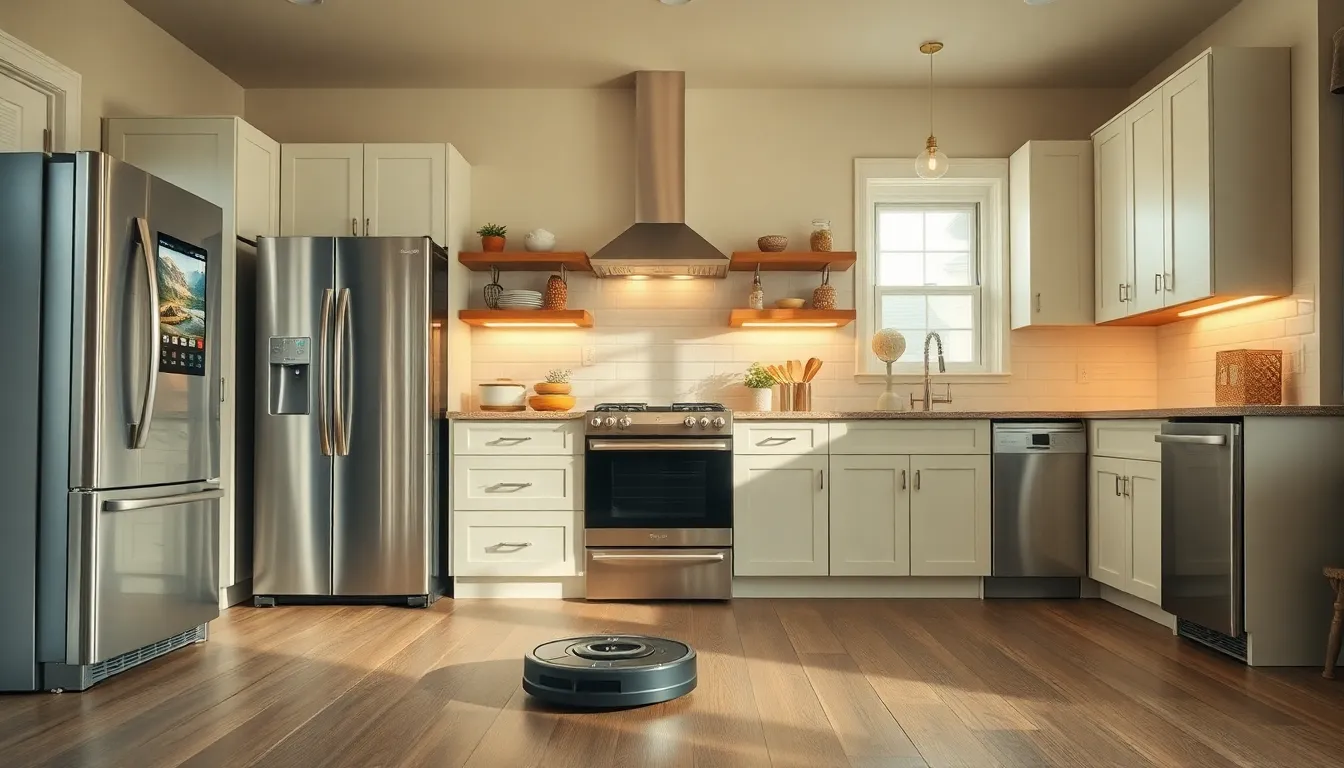Imagine a world where your appliances not only do the heavy lifting but also chat with you like an old friend. Welcome to the era of smart appliances, where the mundane tasks of daily life get a high-tech makeover. These gadgets aren’t just about convenience; they’re about making life a little easier and a lot more fun.
Table of Contents
ToggleOverview of Smart Appliances
Smart appliances integrate advanced technology to simplify daily routines. They connect to the internet, enabling remote access and control. Notable examples include smart refrigerators that track inventory and suggest recipes based on available ingredients. Additionally, smart ovens can preheat and adjust cooking times from a smartphone app.
Energy efficiency often ranks high in the features of these devices. For instance, smart thermostats learn user preferences and optimize heating or cooling schedules, saving energy costs. Users frequently appreciate the compatibility of smart appliances with voice assistants like Amazon Alexa or Google Assistant. This functionality allows for hands-free operation, enhancing user experience and convenience.
Security is another consideration with smart appliances. Certain models include built-in cameras or alerts that notify users of unusual activity, especially in smart refrigerators or security systems. Home automation ecosystems often promote the seamless operation of multiple smart devices, creating a unified smart home experience.
Maintenance notifications contribute to their practicality. Many appliances alert users about potential issues, such as leaks in washing machines or low detergent levels, promoting proactive care. They also integrate with smart home networks, allowing users to control all devices through a centralized platform.
Overall, smart appliances represent the convergence of technology and everyday living, transforming household management into an efficient and interactive experience.
Types of Smart Appliances

Smart appliances encompass various devices designed to enhance home efficiency and convenience. They facilitate seamless integration into daily routines, fulfilling specific needs across different areas of life.
Kitchen Appliances
Smart kitchen appliances streamline food preparation and cooking tasks. Smart refrigerators monitor inventory levels and suggest grocery lists. Wi-Fi-enabled ovens allow users to adjust settings remotely and track cooking progress through apps. Additionally, smart dishwashers optimize cleaning cycles based on load types to save water and energy.
Home Cleaning Devices
Home cleaning devices facilitate effortless upkeep, reducing the burden of household chores. Robot vacuums autonomously navigate spaces, adjusting their cleaning paths based on room layouts. Smart mops provide targeted cleaning abilities, removing dirt and stains while optimizing water usage. Furthermore, air purifiers equipped with smart technology actively monitor air quality, adjusting filters as needed to maintain a healthy living environment.
Energy Management Systems
Energy management systems enhance efficiency and sustainability in homes. Smart thermostats learn user schedules to optimize heating and cooling, lowering energy bills. Smart plugs enable control of individual devices, allowing users to monitor and reduce energy consumption. Lastly, smart lighting systems adapt to user preferences, offering automation and energy savings while providing ideal illumination for different tasks and moods.
Benefits of Smart Appliances
Smart appliances offer various advantages that significantly impact household management and user experience. They combine advanced features with practical benefits, making daily activities more streamlined.
Convenience and Automation
Convenience thrives with smart appliances as they simplify everyday tasks. Users control their devices remotely through smartphone apps. Cooking becomes effortless when smart ovens receive commands to preheat while users are out. Smart refrigerators manage grocery inventories, sending notifications when supplies run low. Users can even delay laundry cycles with smart washers, optimizing schedules to fit their lifestyles. Automation further enhances efficiency, allowing one-touch settings for common tasks. A greater level of comfort in home management emerges as these appliances work seamlessly together.
Energy Efficiency
Energy efficiency stands out as a primary benefit of smart appliances. Smart thermostats adjust heating and cooling based on user habits, leading to reduced energy bills. Additionally, users can monitor energy consumption through connected apps. For instance, a smart plug can schedule on/off timings for devices, ensuring they only operate when needed. Integrated sensors in appliances can detect usage patterns, minimizing energy waste. As a result, households experience significant cost savings and lower environmental impact.
Enhanced Security Features
Enhanced security features provide peace of mind when using smart appliances. Many devices include built-in cameras that allow users to monitor their homes in real time. Notifications alert users of unusual activity, ensuring a quick response. Smart locks enable remote access control, granting entry only to authorized individuals. Connections with security systems enhance overall home safety by integrating various devices for a cohesive response. Users appreciate knowing their homes are secure, even when away.
Considerations When Buying Smart Appliances
Smart appliances offer advanced technology and convenience, making thoughtful considerations crucial before purchase.
Compatibility with Smart Home Systems
Compatibility enhances the overall smart home experience. Ensure each appliance connects seamlessly with existing systems, such as Google Home or Amazon Alexa. Appliances not designed for compatibility may limit functionality. Check manufacturer specifications to confirm compatibility with preferred voice assistants or smart hubs. Research reviews indicating user experiences with integration, as those insights highlight any potential issues.
Cost and Budget
Establishing a budget helps manage expectations. Identify the range of smart appliances available in your price bracket. Prices vary widely based on features, brand reputation, and technology level. While investing in high-quality devices may incur higher upfront costs, energy-saving features often result in long-term savings on utility bills. Researching financing options or seasonal promotions can also provide opportunities for cost-effective purchases.
Brand Reputation
Brand reputation plays a vital role in decision-making. Established brands often signify reliability and robust customer support. Assess customer reviews and ratings for insight into product performance and durability. Selection of brands with comprehensive warranties indicates commitment to quality. Research any history of recalls or customer service complaints, as this information reveals overall customer satisfaction and product dependability.
Future Trends in Smart Appliances
In the realm of smart appliances, several trends are emerging that shape the future of home automation. Integration with artificial intelligence enhances functionality, allowing devices to learn user preferences and habits over time. Personalization becomes a central focus, as devices adjust settings based on individual routines for greater convenience.
Data analytics drives efficiency, enabling appliances to monitor energy consumption in real time. This feature supports users in making informed decisions, ultimately leading to reduced energy costs. Collaborative technologies are also on the rise; interoperability among various brands allows for seamless communication between devices. Users will enjoy a more cohesive smart home ecosystem.
Sustainability continues to influence design, prompting manufacturers to prioritize energy-saving features. Eco-friendly materials are being utilized, reflecting increasing consumer demand for green technologies. Voice control capabilities expand, with smart appliances becoming even more compatible with voice assistants, making operation hands-free and user-friendly.
Security advancements play a crucial role as well, with appliances featuring enhanced encryption and user authentication layers. These improvements provide added protection against potential cyber threats. New connectivity options, such as 5G integration, promise faster data transfer and response times, elevating overall user experience.
Lastly, augmented reality is finding its way into smart appliance features, enabling users to visualize appliance functions before making a commitment. Virtual assistance through AR applications enhances user interaction, presenting an innovative approach to appliance use and maintenance. Overall, these trends contribute to a future where smart appliances significantly improve daily living experiences.
Smart appliances are revolutionizing the way people manage their homes. By integrating advanced technology into everyday tasks, these devices not only enhance convenience but also contribute to a more efficient and enjoyable lifestyle. With features like remote access energy management and enhanced security, users can experience a new level of control and peace of mind.
As technology continues to evolve the future of smart appliances looks promising. Innovations such as artificial intelligence and augmented reality will further personalize and optimize home environments. Embracing these advancements allows individuals to simplify their routines while prioritizing sustainability and efficiency. The journey toward a smarter home is just beginning and the benefits are undeniable.





